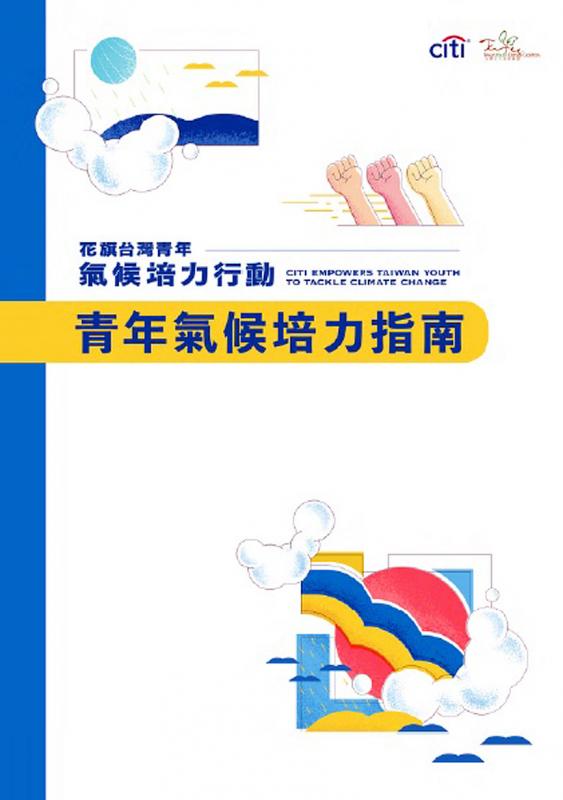As unprecedented downpours in Europe, China and India have shown, climate change is a challenge that all humanity must face in the 21st century. Last year, Citibank Taiwan Ltd (花旗台灣) and the Taiwan Youth Climate Coalition (TWYCC) jointly launched a series of initiatives called Citi Empowers Taiwan Youth to Tackle Climate Change. One part, titled “Taiwan Conference of Youth,” has attracted more than 360,000 views.
To increase awareness of climate change, Citibank Taiwan and the TWYCC have published the Citi Empowers Taiwan Youth to Tackle Climate Change guide, which assembles information on climate change; international trends in environmental, social and corporate governance (ESG) goals and climate issues; and insights from experts in Taiwan and overseas. The guide is available on the Citi Youth Climate Power Initiative’s Facebook page.
“A recent Citi Asia Pacific report shows that more than half of companies have incorporated ESG strategies and practices into their overall corporate strategy,” said April Pan (潘玲嬌), head of Citibank Taiwan’s country corporate affairs and government affairs department. “Citibank Taiwan understands the importance of ESG sustainability issues — and not only released its first certified ESG report last year, but has also worked with its employees, customers, non-profits and other stakeholders to implement the UN Sustainable Development Goals on sustainable cities and communities, climate action, life below water and partnerships for the goals.”

Photo courtesy of Citibank Taiwan Ltd
In addition to pursuing sustainable development for businesses and the environment, Citi is committed to promoting youth empowerment.
“In Taiwan, a group of young people have stepped forward to address climate change and promote climate diplomacy through the far-reaching influence of the Internet,” Pan added. “We hope that through their creativity and energy, we can inject much-needed positive energy into raising more awareness on climate issues among the younger generation and the general public.”
“As a result, in 2020, Citibank Taiwan started working with the TWYCC and launched the Citi Empowers Taiwan Youth to Tackle Climate Change initiative, hoping, through a variety of programs, to increase awareness about the global warming crisis and help people understand how they can practice low-carbon living and achieve environmental sustainability,” she said.
The guide is a treasure trove of knowledge, containing all of the information that Taiwanese youth need to tackle climate change. Featuring Citigroup Inc chief sustainability officer Valerie Smith and international experts, the guide includes trends in international ESG and climate issues, as well as how climate change is linked to digital media, diplomacy and the UN. It also gives readers insight into the mechanics of international climate negotiations and provides tips on how to fight climate change in daily life.
The Citi Empowers Taiwan Youth to Tackle Climate Change initiative seeks to assist Taiwanese youth in their understanding of climate change issues and to encourage them to explore environmental issues more deeply.
In addition to the Citi Empowers Taiwan Youth to Tackle Climate Change guide, which is being launched today, other initiatives such as the Taiwan Conference of Youth, the World Climate Workshop and an online public commitment campaign have benefited nearly 370,000 people.
In addition, Citi was named Best Bank for Corporate Responsibility in Asia by Euromoney in their recent annual awards, announced on July 14. The editorial award recognizes a bank’s commitment to fostering diversity and inclusion; reducing the environmental impact of operations; promoting workforce development and social mobility; and innovative and effective initiatives to strengthen local communities in which banks are domiciled.

South Korea’s equity benchmark yesterday crossed a new milestone just a month after surpassing the once-unthinkable 5,000 mark as surging global memory demand powers the country’s biggest chipmakers. The KOSPI advanced as much as 2.6 percent to a record 6,123, with Samsung Electronics Co and SK Hynix Inc each gaining more than 2 percent. With the benchmark now up 45 percent this year, South Korea’s stock market capitalization has also moved past France’s, following last month’s overtaking of Germany’s. Long overlooked by foreign funds, despite being undervalued, South Korean stocks have now emerged as clear winners in the global market. The so-called “artificial intelligence

NEW IDENTITY: Known for its software, India has expanded into hardware, with its semiconductor industry growing from US$38bn in 2023 to US$45bn to US$50bn India on Saturday inaugurated its first semiconductor assembly and test facility, a milestone in the government’s push to reduce dependence on foreign chipmakers and stake a claim in a sector dominated by China. Indian Prime Minister Narendra Modi opened US firm Micron Technology Inc’s semiconductor assembly, test and packaging unit in his home state of Gujarat, hailing the “dawn of a new era” for India’s technology ambitions. “When young Indians look back in the future, they will see this decade as the turning point in our tech future,” Modi told the event, which was broadcast on his YouTube channel. The plant would convert

‘SEISMIC SHIFT’: The researcher forecast there would be about 1.1 billion mobile shipments this year, down from 1.26 billion the prior year and erasing years of gains The global smartphone market is expected to contract 12.9 percent this year due to the unprecedented memorychip shortage, marking “a crisis like no other,” researcher International Data Corp (IDC) said. The new forecast, a dramatic revision down from earlier estimates, gives the latest accounting of the ongoing memory crunch that is affecting every corner of the electronics industry. The demand for advanced memory to power artificial intelligence (AI) tasks has drained global supply until well into next year and jeopardizes the business model of many smartphone makers. IDC forecast about 1.1 billion mobile shipments this year, down from 1.26 billion the prior

People stand in a Pokemon store in Tokyo on Thursday. One of the world highest-grossing franchises is celebrated its 30th anniversary yesterday.